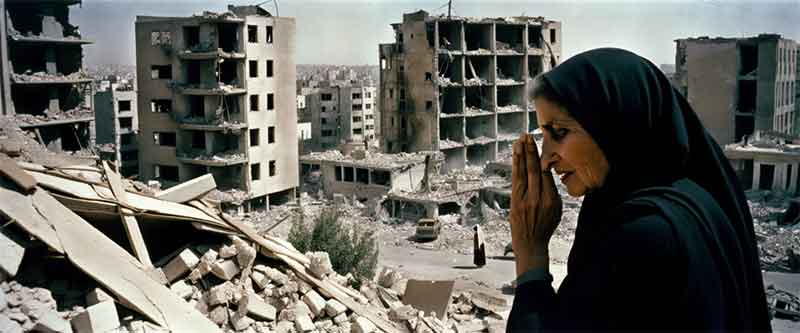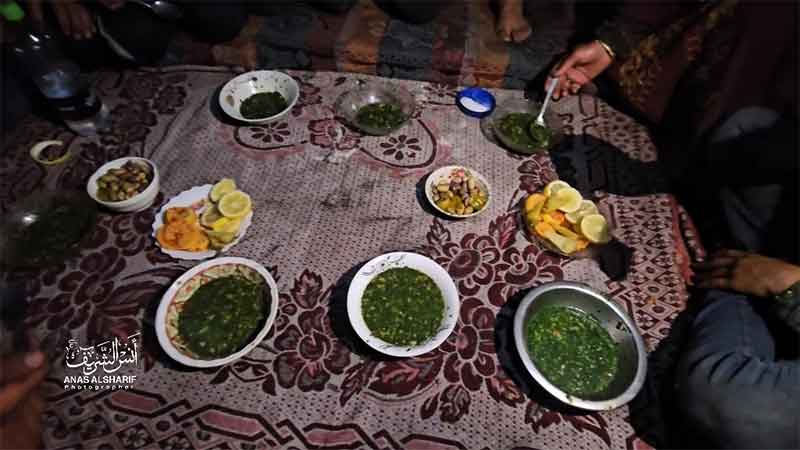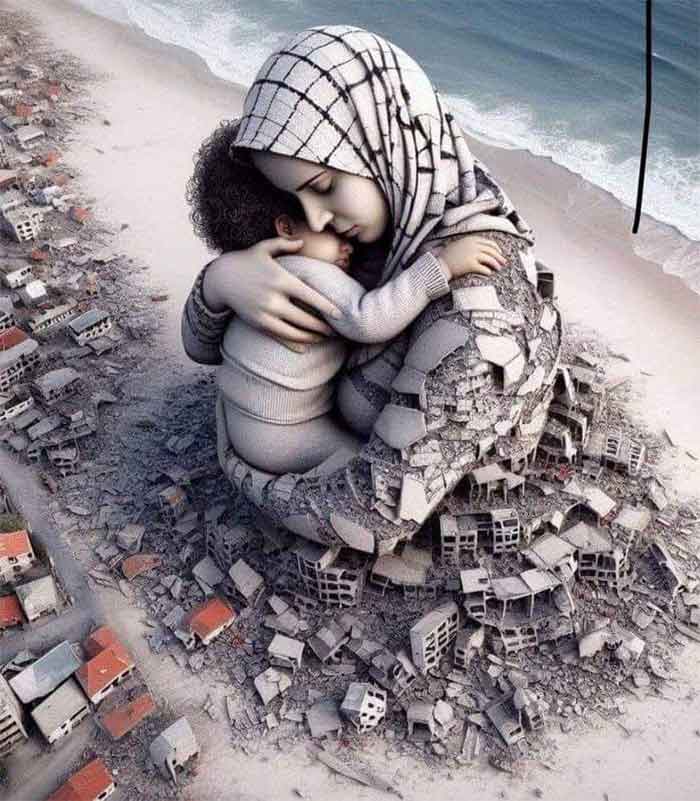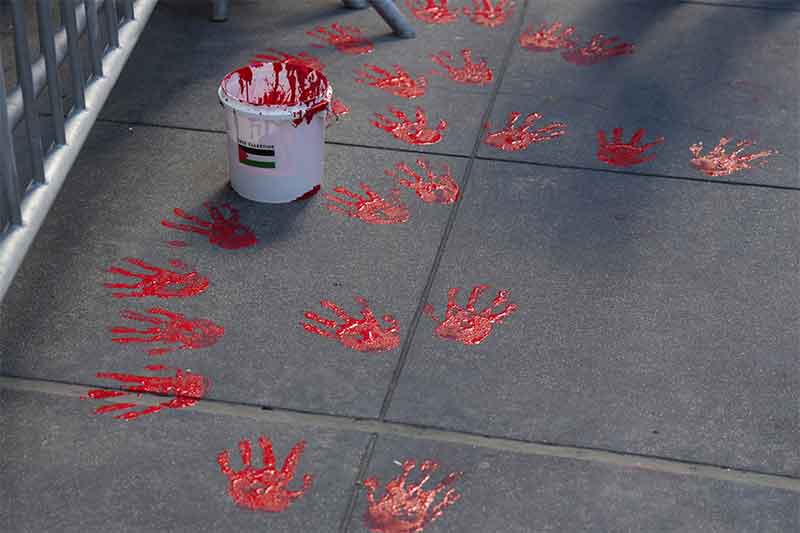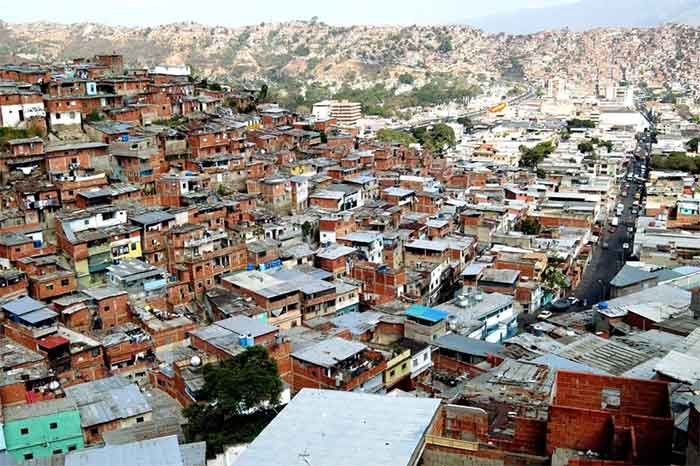
How sad the rain sounds
On the cardboard roofs
How sad that my people live
In cardboard houses
The worker is coming down [from the hills]
Almost dragging his feet
From the weight of suffering
Look how much he suffers
Look how much the suffering weighs
Above he leaves his pregnant wife
Down the hill is the city
He loses himself in its labyrinth
Today is the same as yesterday
In a world without tomorrow
How sad the rain sounds
On the cardboard roofs
How sad that my people live
In the cardboard houses
Children the color of earth
With their same scars
Millions of parasitic worms
And that’s why
The children live sadly
In cardboard houses
How happy the dogs live in
The exploiter’s house.
You are not going to believe it
But there are schools for dogs
Where they train them
Not to bite the newspapers.
But the Boss!
For years, many years
He’s been biting the worker
How sad the rain sounds
On the cardboard roofs
Hope passes so far away from
The cardboard houses
Translated by: various
Note:
Alí Rafael Primera Rosell (1942 –1985) was a Venezuelan musician, composer, poet, and political activist. He was one of the best-known representatives of Nueva canción, (“new song”) in Venezuela. His songs condemned exploitation and repression, and celebrated resistance and were popular among mass people. He is popularly known in Venezuela as El Cantor del Pueblo (The People’s Singer). In 2005, the government of Venezuela declared his music to be a part of the national heritage of Venezuela.
বঙ্গানুবাদ:
পোড়ো ঘরের গান
আমাদের এই বিষণ্ণ পোড়োঘরে,
নুয়েপড়া ছাদে,
বৃষ্টি আরো বিষাদে ঝরছে; ঠিক যেমন
আমাদের মত আরো যাদের,
দিন-রাত কেটে যায়,
এই বঞ্চনার সাথে বসবাসে।
সে মজুর খেটে ফিরছে, পাহাড়ের পথে তার শ্রান্ত পা টেনে-টেনে,
কতটা ভারি প্রচণ্ড যুদ্ধ, স্বেদ, ঘাম,
হারানো স্বপ্নের বোঝা কাঁধে তার,
রক্তচোখে তার কতটুকু ধূসর সময়,
দেখো তার মেরুদণ্ডে কতটা পাহাড়
প্রতিদিন একা বয়ে নিয়ে যেতে হয়।
অন্তঃসত্ত্বা প্রিয়তমাকে সে রেখে এসেছে,
আর এখন তাকে পাড়ি দিতে হবে এই শহরের বিকট গোলকধাঁধাঁ,
গতকাল, আজ সব তার কাছে এক হয়ে গেছে,
এই দুনিয়ায় তার জন্য আগামি আসে নি, তাই,
কী বিষণ্ণ বেজে যায় বৃষ্টির সাইরেন,
এই পোড়োঘরে, নিরানন্দ ছাদে।
আমাদের, আমাদের মানুষদের জীবন
বাঁধা পড়ে যায় নেহাত একটুকু, এক ছটাকে।
মাটিরঙ্গা আমাদের সন্তানেরা
সেই এক ক্ষত, একই দাগ, বুকে নিয়ে ঘুরছে,
ওদের পেটে কৃমির দল,
শুষে নিচ্ছে যা কিছু ওদে রপ্রাপ্য;
আর তাই ওদের দিন কাটছে বিধুর
এই বস্তির নিরানন্দ পোড়োঘরে।
অথচ মালিকের বাসায় কুকুরেরা আরামে আছে,
সারমেয় সুখে ওদের জন্য আছে ইশকুল,
খবরে না কামড়ানোর ট্রেনিং,
ওদিকে, মালিক কামড়ে ক্ষতবিক্ষত করছে
মজুরদের, কত যুগ ধরে।
এ বিষম বিষণ্ণ বৃষ্টি ঝরছে
আমাদের পোড়োঘরে,
বিহনের বিরলে আমাদের একটুকু আশা, স্বপ্ন,
তাও গেছে কতদূর, কতদূর ভেসে।।
অনুবাদঃ ওমর রশীদ চৌধুরী
নোট:
অ্যালি রাফায়েল প্রিমেরা রাসেল (১৯৪২ – ১৯৮৫) ভেনেজুয়েলার খ্যাতনামা কবি, গীতিকার, সঙ্গীতশিল্পী এবং রাজনৈতিককর্মী। ভেনেজুয়েলায় ‘নুয়েভাকানসিওন’ বা ‘নতুনগান’ এর ধারার প্রতিনিধিদের মধ্যে তিনি সব চেয়ে পরিচিত মুখ। তাঁর গান পুঁজিপতিশ্রেণীর শাসন-শোষণ এর বিরুদ্ধে প্রতিবাদ আর বিদ্রোহের কথা বলে। সাধারণ্যে তাই তাঁর গান জনপ্রিয়। ভেনেজুয়েলায় তিনি পরিচিত ‘জনতার গায়ক’ (এল কানতোর দেল পাবলো) হিসেবে। তাঁর গান, কবিতাকে ২০০৫ এ জাতীয় কৃষ্টি ও ঐতিহ্যের অংশ হিসেবে ঘোষণা করে ভেনেজুয়েলার সরকার।
Original Spanish version
Casas de Carton
Qué triste se oye la lluvia
En los techos de cartón
Qué triste vive mi gente
En las casas de cartón
Vienebajando el obrero
Casiarrastrando los pasos
Por el peso del sufrir
Mira que mucho ha sufrir
Mira que pesa el sufrir
Arriba deja la mujerpreñada
Abajo esta la ciudad
Y se pierdeensumaraña
Hoy es lo mismo que ayer
Ensumundo sin mañana
Quétriste se oye la lluvia
En los techos de cartón
Qué triste vive mi gente
En los techos de cartón
Niños color de mi tierra
Con sus mismascicatricez
Millonarios de lombrices
Y por eso
Qué tristes viven los niños
En las casas de cartón
Quéalegresviven los perros
Casa del explotador
Usted no lo va a creer
Pero hay escuelas de perros
Y les dan educación
Pa’ que no muerdan los diarios
Pero el patrón!
Haceañosmuchosaños
Quéestamordiendo al obrero
Quétriste se oye la lluvia
En los techos de cartón
Quélejospasa la esperanza
En las casas de cartón


